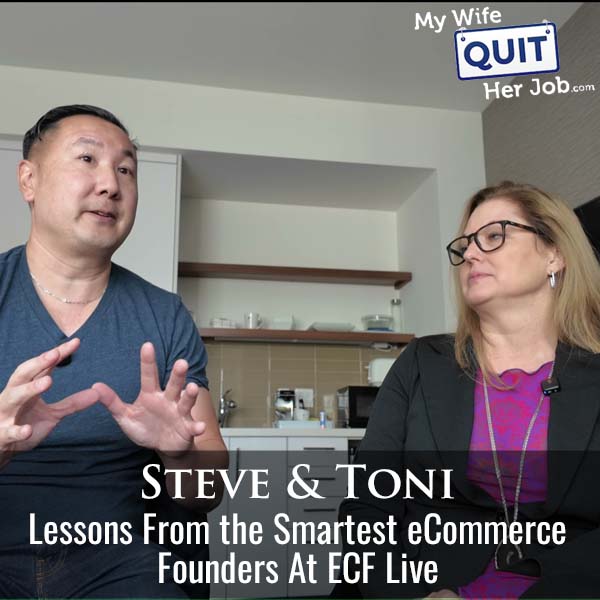612: Lessons From the Smartest eCommerce Founders At ECF Live

```html Ecommerce Experts Share Insights on Automation and Inventory Forecasting at ECF Live
Bozeman, MT – Ecommerce experts, Steve and Toni Chou of MyWifeQuitHerJob.com, recently attended Ecommerce Fuel Live (ECF Live) in Bozeman, Montana, and shared key takeaways focused on automation and inventory forecasting. Their discussion, featured on the My Wife Quit Her Job podcast, highlighted actionable strategies for ecommerce businesses aiming to streamline operations and improve efficiency using AI and readily available tools.
Key Learnings from ECF Live: Automating Repetitive Tasks
The Chous emphasized the importance of identifying and automating repetitive tasks to free up valuable time and resources. Toni Chou noted, "There are so many little processes in business every day that you do that could be automated." She specifically pointed to AI automation as a game-changer, allowing businesses to optimize workflows and reduce manual intervention.
Personalized Customer Outreach Automation
One specific automation example discussed was triggered by high-value orders. Toni explained that for businesses selling lower-priced items, a large order often indicates a group purchase. "If someone comes in and spends $800, they are probably a group or a church or a co-op," she stated. The proposed solution involves automating a personalized outreach email or phone call to these customers, fostering a personal connection and potentially securing repeat business. This contrasts with generic Klaviyo email sequences that might not be appropriate for such customers. The current manual process of identifying these orders and notifying the customer service team was deemed inefficient and ripe for automation.
Inventory Forecasting with AI
Another significant takeaway was the potential for AI-powered inventory forecasting. While acknowledging that sophisticated inventory management software can be costly and underutilized, the Chous suggested leveraging AI tools for more targeted and affordable forecasting. Steve Chou noted that while these SaaS solutions can be expensive and feature-rich, "Most people, unless you’re a trained person on that tool, you’re probably using 10% of what that tool can do." By piping order data into AI, businesses can gain valuable insights into demand patterns and optimize inventory levels, reducing stockouts and minimizing excess inventory costs.
Tools and Technologies: N8n vs. Make
The podcast also delved into specific tools for implementing automation. N8n and Make were highlighted as alternatives to Zapier, which was described as "ridiculously expensive." N8n offers a free, self-hosted option, while Make provides a cost-effective solution for smaller operations before transitioning to N8n. These platforms allow businesses to connect various software applications, such as Shopify and AI tools, enabling seamless data flow and automated workflows.
Expert Perspective: The Rise of AI in Ecommerce Operations
Dr. Anya Sharma, a professor of e-commerce and digital marketing at the University of California, Berkeley, comments on the increasing role of AI in streamlining e-commerce operations. "The insights shared by the Chous reflect a broader trend in the e-commerce industry," Dr. Sharma explains. "AI-powered automation is no longer a futuristic concept but a practical tool for businesses of all sizes. By automating tasks like customer outreach and inventory forecasting, companies can improve efficiency, reduce costs, and enhance customer experience."
The Human Element Remains Crucial
Dr. Sharma also stresses the importance of maintaining a human element in automated processes. "While AI can automate many tasks, it's crucial to remember that customer relationships are built on trust and personal interaction," she cautions. "Businesses should use automation to enhance, not replace, human interaction, ensuring that customers feel valued and understood."
Historical Context and Future Trends
The shift towards automation in e-commerce has been a gradual process, driven by advancements in technology and increasing competition. In the early days of e-commerce, businesses relied heavily on manual processes for everything from order fulfillment to customer service. As the industry matured, companies began to adopt software solutions to automate specific tasks, such as email marketing and inventory management. The advent of AI has accelerated this trend, enabling businesses to automate more complex and nuanced processes.
Looking ahead, the use of AI in e-commerce is expected to continue to grow. Experts predict that AI will play an increasingly important role in areas such as product recommendation, fraud detection, and personalized marketing. As AI technology becomes more sophisticated and accessible, businesses that embrace automation will be well-positioned to thrive in the competitive e-commerce landscape.
Sellers Summit 2026: A Focus on Tactical Strategies
Steve Chou also promoted the upcoming Sellers Summit 2026, an ecommerce conference focused on providing tactical, step-by-step strategies for online businesses. The event, known for its intimate setting and emphasis on actionable advice from experienced ecommerce operators, will take place in Fort Lauderdale. Tickets are currently on sale at SellersSummit.com.
The insights shared by the Chous highlight the growing importance of automation and AI in the e-commerce industry. By embracing these technologies, businesses can streamline operations, improve efficiency, and enhance customer experience, ultimately driving growth and success. ```
Originally sourced from: WifeQuitHer Job
